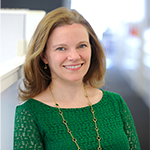Senior Editor, Oxford University Press (OUP)
 Please tell us a bit about yourself (e.g. hometown, current locale, course of study).
Please tell us a bit about yourself (e.g. hometown, current locale, course of study).
I grew up outside of Philadelphia and attended my mother’s alma matter Elizabethtown College in central Pennsylvania. I was pretty indecisive in choosing a major and bounced among biology, education, and sociology for a few semesters before settling on a biology major and chemistry minor because I was confident that it would offer the greatest range of employment opportunities in the future.
Describe some of your current responsibilities, and what type of organization you belong to.
I have been with Oxford University Press (OUP) for four years. OUP is one of the largest university presses in the industry and we currently publish more than 360 scholarly journals, over two thirds of which we publish on behalf of academic societies. My role as Senior Editor is to manage the relationships and full financial responsibility for a small portfolio of high-profile journals owned by scientific and medical society clients. My key responsibilities include acting as the clients’ main point of contact with OUP, balancing the expectations of the company and each client to ensure a mutually beneficial relationship, growing profitability, serving as the clients’ advocate within OUP, successfully executing strategic development plans, and updating clients on the progress of agreed objectives and financial profitability. I also have an acquisitions component of my role, where I establishing relationships with potential clients and educating them on the benefits of establishing a publishing relationship with OUP. This involves researching potential clients, communicating at conferences and meetings, preparing proposal documents that summarize the benefits of working with OUP, and making presentations to potential clients. I really enjoy public speaking so this is one of my favorite aspects of my job!
What was your first scholarly publishing role? How did you get that job? What path led to your current position?
After college, I moved right to New York City and started working as a Lab Tech in a neuroscience lab at New York University Medical Center where my role consisted mainly of harvesting cells from embryonic rats and maintaining the rat colonies. I always thought it was kind of an ironic job, given that I was living in what some people think of as the rat capitol of the world! After working in the lab for two years I determined that the role wasn’t a good fit for me because it lacked the interpersonal connections that I was looking for in a job. A friend at the time worked in educational science publishing and I soon moved to editing elementary school science textbooks and made the move to medical journals publishing soon after. My first scholarly publishing role was as a Managing Editor with Informa Healthcare (a division of Informa plc) where I managed the day to day operations of a portfolio of about 25 medical journals. After working for a year on how to explain complex scientific concepts to first graders, it was more than a tad overwhelming!
What tools, web sites and organizations do you find most valuable for your career development?
I always find medical and science conferences to be incredibly valuable to me because they allow me to see the direction of a field of study and provide discussion points for me to bring up with my Editors and societies about how we can ensure that their journals provide an appropriate forum for the research being published. Conferences also give me the opportunity to meet colleagues who have similar roles with other publishers and discuss how they are approaching common industry challenges.
What are some of the surprises/obstacles that you’ve encountered during your career?
I always remember being very surprised when I first started as a Managing Editor that I didn’t need to know nearly as much about the content of these serious academic journals as I thought I did. It was more important to understand the needs of my Editors and societies, the publishing process, and the publishing industry. This knowledge would allow me to problem solve, which was at the center of my role then as well as today. To this day, I think of my role as much more of a customer service position than an editorial position because I am so engaged with clients and ensuring that their needs are met, while also balancing the expectations of the company.
What do you wish you knew more about?
I would love to be more of a “techie” and understand new online developments and how we can optimize our journal’s websites to be compatible and market-leading.
What advice would you give to people interested in a career in scholarly communications?
Don’t worry if you don’t understand the content that your journals are publishing – in a role such as mine it is much more important to be a good project manager, be able to communicate well with people, and enjoy problem solving!

